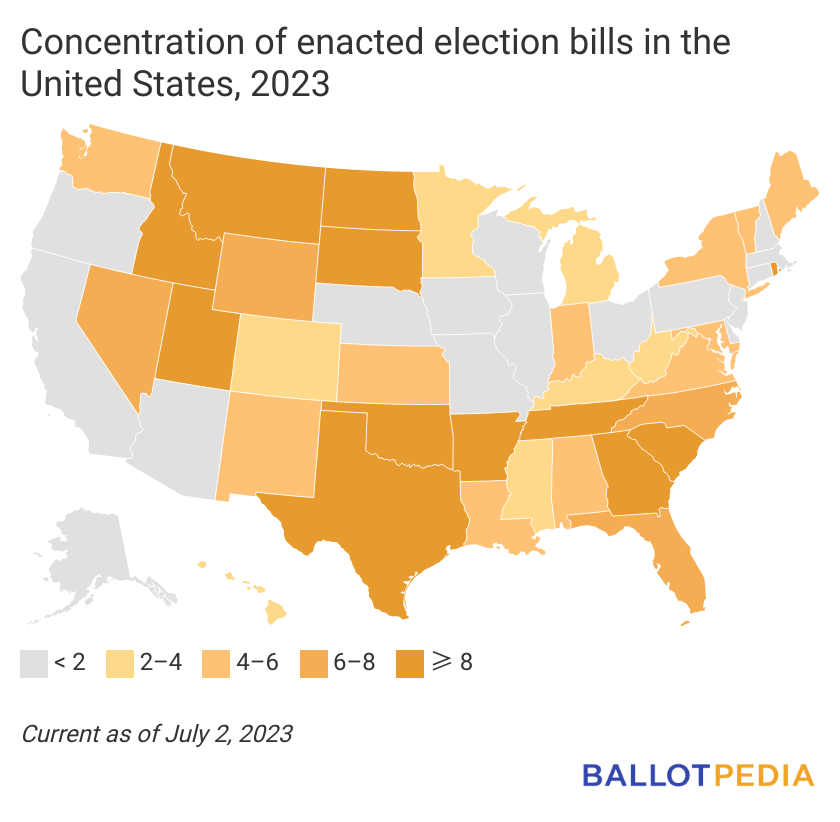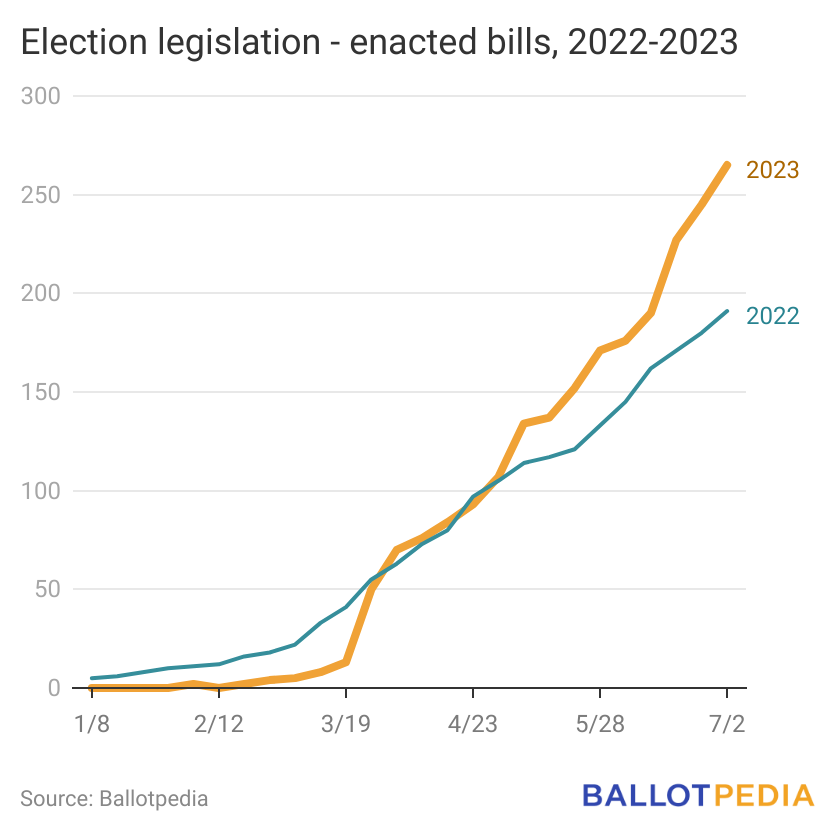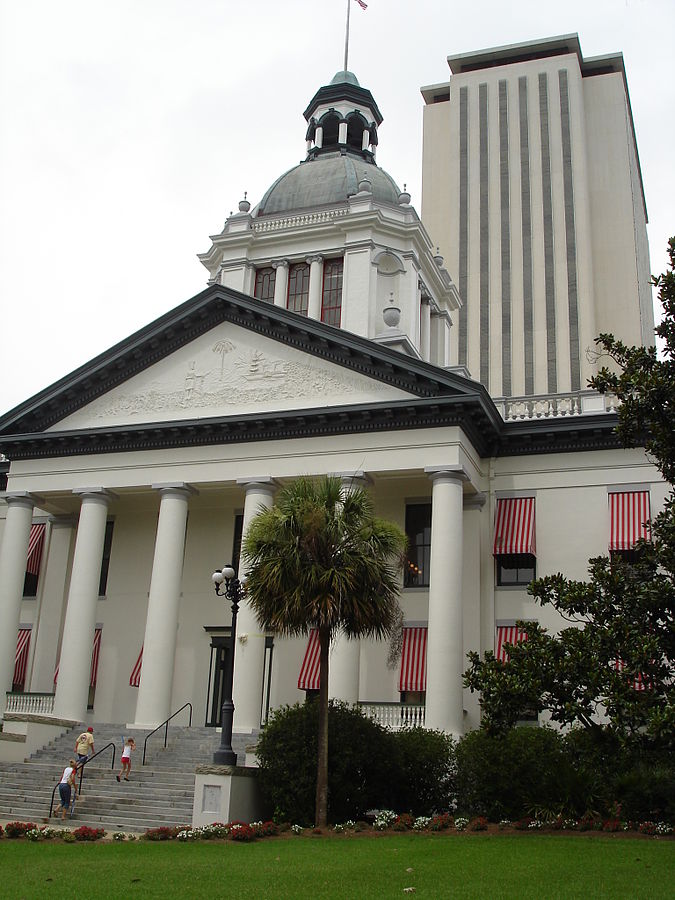As of July 2, members of the Florida State Legislature, which includes the Florida House of Representatives and the Florida State Senate, have passed eight bills related to election administration since the beginning of the year.
Of the eight bills passed this year, eight have been enacted. This is five more than this point a year ago. Republicans sponsored the eight bills. Five of eight bills are below:
- FL H1565: Town of Fort White, Columbia County, Rep. Robert Brannan (R).
- As amended, this bill:
- Amends the term “Councilman” to “Councilmember.”
- Modifies the length of the mayor’s term from three years to four years in the town of Fort White.
- Provides that members of the town council of the Town of Fort White will be elected via district elections for four-year terms.
- Modifies the start of term for newly elected members from 8 p.m. on the fourth Tuesday of August to the beginning of the next regular or special meeting after the election results are final.
- Codifies district boundaries for members of the town council.
- Click the hyperlinked bill number above for more information.
- As amended, this bill:
- FL H1611: City of Bartow, Polk County, Reps. Fabian Basabe (R), Melony Bell (R), and Sam Killebrew (R).
- As introduced, this bill:
- Establishes an independent, special purpose, limited district called Clear Springs Stewardship District, that is subject to the City of Bartow’s comprehensive plan with certain stipulations and requirements.
- Provides that the District has certain revenue raising powers, budget preparation and approval, liens, foreclosures, use of tax deeds and tax certificates, and the ability to enter into certain contractual agreements.
- Outlines the boundaries of the district.
- Outlines the structure of the governing body: a board with five board members called supervisors.
- Establishes procedures for initial elections of supervisors to be held after passage of the act with certain requirements and timelines.
- Click the hyperlinked bill number above for more information.
- As introduced, this bill:
- FL H0031: Partisan Elections for Members of District School Boards, Reps. Webster Barnaby (R), Fabian Basabe (R), Dean Black (R), Randall Fine (R), Mike Giallombardo (R), Thomas Leek (R), Ralph Massullo (R), Jenna Persons-Mulicka (R), Alejandro Rizo (R), Spencer Roach (R), Rick Roth (R), Joel Rudman (R), Michelle Salzman (R), Tyler Sirois (R), and Dana Trabulsy (R).
- This joint resolution proposes amendments to the Florida Constitution—an amendment to Article IX Section 4 and a new section in Article XII—that would require school board members to be elected in partisan elections beginning in the November 2026 general election and allow for partisan primaries ahead of the 2026 election. This is a legislatively referred constitutional amendment for voters to decide at the 2024 general election.
- FL H0411: Residency of Local Elected Officials, Reps. Sam Killebrew (R), Thomas Leek (R), Stanley McClain (R), Rick Roth (R), Kevin Steele (R), and Dana Trabulsy (R).
- This bill will require school board candidates to be residents of the district by the time they take office.
- FL S0004: Statewide Prosecutor, Sen. Jonathan Martin (R).
- As amended, this bill:
- Provides that the Department of Legal Affairs in the Office of Statewide Prosecution will investigate any crime involving voting in federal, state, referendum, initiative, and issue elections, as well as any petition activities for said elections.
- Provides that the Department of Legal Affairs in the Office of Statewide Prosecution will investigate any crime involving voter registration.
- Provides that the Department of Legal Affairs in the Office of Statewide Prosecution will investigate any attempt, solicitation, or conspiracy to commit related crimes.
- Empowers the office to act in specified circumstances.
- Requires information and indictments to contain general allegations stating where the crimes are alleged to have occurred.
- As amended, this bill:
From June 26–July 2, legislators passed 19 bills related to election administration nationally. As of July 2, Texas legislators have passed the most bills this year with 34, while Alaska, Missouri, New Hampshire, Pennsylvania, and Wisconsin legislators have passed the fewest bills with zero. The state with the most enacted bills is Texas with 32, while eight states have enacted none.


The Florida State Legislature was scheduled to be in regular session from March 7 to May 5 this year. In 2022, Florida legislators passed four election-related bills, all in the state Senate. Three of the bills were enacted into law. Florida is a Republican trifecta, meaning Republicans control the governorship and both chambers of the state legislature.
Additional reading:


